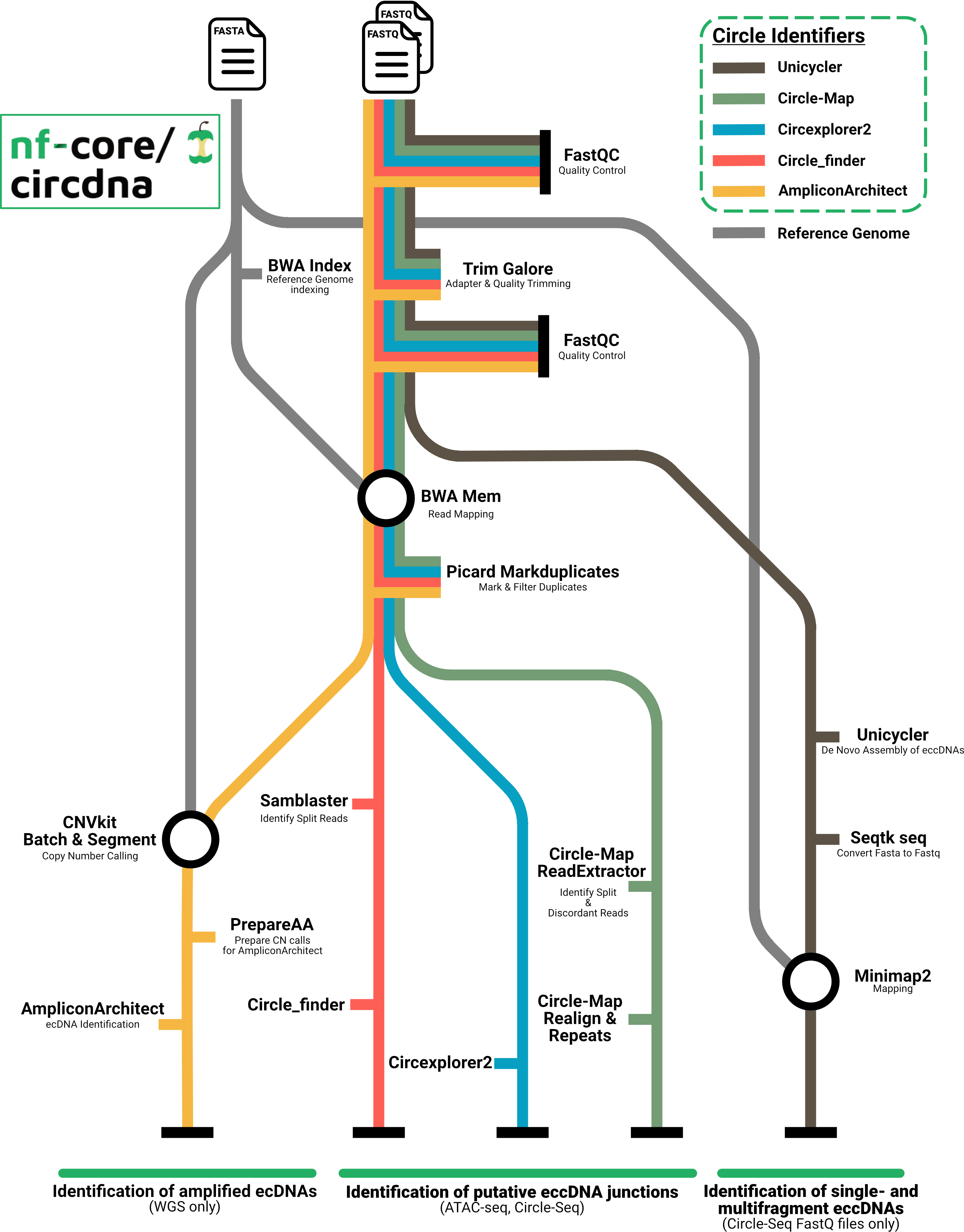nf-core/circdna
Pipeline for the identification of extrachromosomal circular DNA (ecDNA) from Circle-seq, WGS, and ATAC-seq data that were generated from cancer and other eukaryotic cells.
1.0.3dev-alpha). The latest
stable release is
1.1.0
.
Introduction
nf-core/circdna is a bioinformatics best-practice analysis pipeline for the identification of circular DNAs in eukaryotic cells. The pipeline is able to process WGS, ATAC-seq data or Circle-Seq data generated from short-read sequencing technologies.
The pipeline is built using Nextflow, a workflow tool to run tasks across multiple compute infrastructures in a very portable manner. It uses Docker/Singularity containers making installation trivial and results highly reproducible. The Nextflow DSL2 implementation of this pipeline uses one container per process which makes it much easier to maintain and update software dependencies. Where possible, these processes have been submitted to and installed from nf-core/modules in order to make them available to all nf-core pipelines, and to everyone within the Nextflow community!
On release, automated continuous integration tests run the pipeline on a full-sized dataset on the AWS cloud infrastructure. This ensures that the pipeline runs on AWS, has sensible resource allocation defaults set to run on real-world datasets, and permits the persistent storage of results to benchmark between pipeline releases and other analysis sources.The results obtained from the full-sized test can be viewed on the nf-core website.
Pipeline summary
- Merge re-sequenced FastQ files (
cat) - Read QC (
FastQC) - Adapter and quality trimming (
Trim Galore!) - Map reads using BWA-MEM (
BWA) - Sort and index alignments (
SAMtools) - Choice of multiple circular DNA identification routes
Circle-Map ReadExtractor->Circle-Map RealignCircle-Map ReadExtractor->Circle-Map RepeatsCIRCexplorer2Samblaster->Circle_finderDoes not use filtered BAM file, specificied with —keep_duplicates false- Identification of circular amplicons
AmpliconArchitect - DeNovo Assembly of circular DNAs
Unicycler->Minimap2
- Present QC for raw reads (
MultiQC)
Functionality Overview
A graphical view of the pipeline and its diverse branches can be seen below.

Quick Start
-
Install
Nextflow(>=22.10.1) -
Install any of
Docker,Singularity(you can follow this tutorial),Podman,ShifterorCharliecloudfor full pipeline reproducibility (you can useCondaboth to install Nextflow itself and also to manage software within pipelines. Please only use it within pipelines as a last resort; see docs). -
Download the pipeline and test it on a minimal dataset with a single command:
nextflow run nf-core/circdna -profile test,YOURPROFILE --outdir <OUTDIR>To test the
ampliconarchitectbranch functionality, please use the following command:nextflow run nf-core/circdna -profile test_AA,YOURPROFILE --outdir <OUTDIR>Note that some form of configuration will be needed so that Nextflow knows how to fetch the required software. This is usually done in the form of a config profile (
YOURPROFILEin the example command above). You can chain multiple config profiles in a comma-separated string.- The pipeline comes with config profiles called
docker,singularity,podman,shifter,charliecloudandcondawhich instruct the pipeline to use the named tool for software management. For example,-profile test,docker. - Please check nf-core/configs to see if a custom config file to run nf-core pipelines already exists for your Institute. If so, you can simply use
-profile <institute>in your command. This will enable eitherdockerorsingularityand set the appropriate execution settings for your local compute environment. - If you are using
singularity, please use thenf-core downloadcommand to download images first, before running the pipeline. Setting theNXF_SINGULARITY_CACHEDIRorsingularity.cacheDirNextflow options enables you to store and re-use the images from a central location for future pipeline runs. - If you are using
conda, it is highly recommended to use theNXF_CONDA_CACHEDIRorconda.cacheDirsettings to store the environments in a central location for future pipeline runs.
- The pipeline comes with config profiles called
-
Start running your own analysis!
nextflow run nf-core/circdna --input samplesheet.csv --outdir <OUTDIR> --genome GRCh38 -profile <docker/singularity/podman/shifter/charliecloud/conda/institute>
Available circular DNA identifiers
Please specify the parameter circle_identifier depending on the pipeline branch used for ecDNA identifaction. Please note that some branches/software are only tested with specific NGS data sets.
Identification of putative ecDNA junctions with ATAC-seq or Circle-seq data
circle_finderuses Circle_finder
circexplorer2uses CIRCexplorer2
circle_map_realignuses Circle-Map Realign
circle_map_repeatsuses Circle-Map Repeats for the identification of repetetive circular DNA
Identification of circular amplicons with WGS data
ampliconarchitectuses AmpliconArchitect
De novo assembly of circular DNAs with Circle-Seq data
unicycleruses Unicycler for de novo assembly of circular DNAs and Minimap2 for accurate mapping of the identified circular sequences.
Example Usage
The user can specify either one or multiple circle_identifier in a comma-separated string (see below).
nextflow run nf-core/circdna --input samplesheet.csv --outdir <OUTDIR> --genome GRCh38 -profile docker --circle_identifier circle_map_realign,unicyclerDocumentation
The nf-core/circdna pipeline comes with documentation about the pipeline usage, parameters and output.
Credits
nf-core/circdna was originally written by Daniel Schreyer, University of Glasgow, Institute of Cancer Sciences, Peter Bailey Lab.
We thank the following people for their extensive assistance in the development of this pipeline:
- Sébastian Guizard: Review and Discussion of Pipeline
- Alex Peltzer: Code Review
- Phil Ewels: Help in setting up the pipeline repository and directing the pipeline development
- nf-core community: Answering all nextflow and nf-core related questions
- Peter Bailey: Discussion of Software and Pipeline Architecture
This pipeline has been developed by Daniel Schreyer as part of the PRECODE project. PRECODE received funding from the European Union’s Horizon 2020 Research and Innovation Program under the Marie Skłodowska-Curie grant agreement No 861196.
Contributions and Support
If you would like to contribute to this pipeline, please see the contributing guidelines.
For further information or help, don’t hesitate to get in touch on the Slack #circdna channel (you can join with this invite).
Citations
If you use nf-core/circdna for your analysis, please cite it using the following doi: 10.5281/zenodo.6685250
An extensive list of references for the tools used by the pipeline can be found in the CITATIONS.md file.
You can cite the nf-core publication as follows:
The nf-core framework for community-curated bioinformatics pipelines.
Philip Ewels, Alexander Peltzer, Sven Fillinger, Harshil Patel, Johannes Alneberg, Andreas Wilm, Maxime Ulysse Garcia, Paolo Di Tommaso & Sven Nahnsen.
Nat Biotechnol. 2020 Feb 13. doi: 10.1038/s41587-020-0439-x.